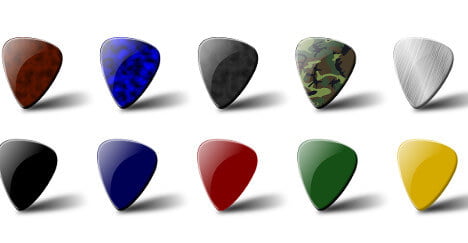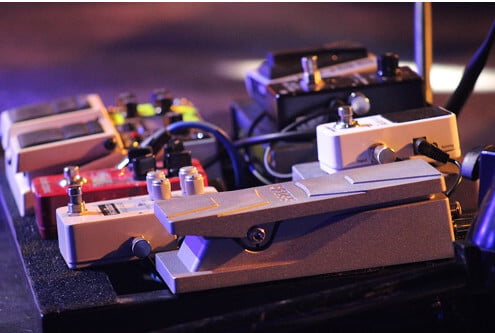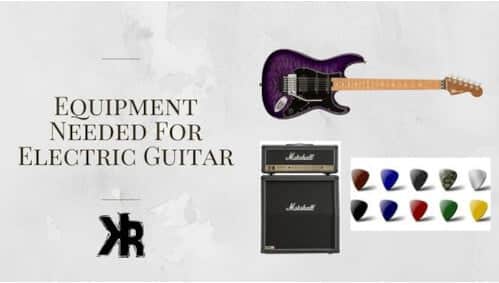Table of Contents
Learning to play the electric guitar brings with it the element of the unknown. Like trying to figure out what is needed to make it work.
Yes, you can play without any other equipment. But it’s pretty quiet by itself, especially solid body guitars. The right equipment needed to play electric guitar will provide a better experience.
You will need an electric guitar, an amplifier, a couple of good instrument cables, and some picks. This will get you started in a way that will provide the right volume and tone.
Some other recommended items are a good tuner, guitar strap, stand, and case. This will help you protect your investment.
This Killer Rig article will explore the different pieces of gear needed to properly play the electric guitar.
Equipment Needed to Play Electric Guitar
To get started playing the electric guitar, you need equipment. This consists of a number of items to amplify the guitar and provide the right volume and tone.
Some are optional, like the tuner, depending on your experience level and if you have one that you use online.
Pro Tip: To save some money, you can use our free online tuner here!
So what do you need for an electric guitar? To make it work properly and have the best electric guitar setup for beginners, you will need these items listed below.
Electric Guitar

The first and most obvious piece of equipment needed to play is an electric guitar. There are many different types and styles of electric guitars on the market.
All made by some great brands, so it’s important to do your research to find the one that is right for you.
If you are a beginner, it might be a good idea to purchase a used guitar, so you don’t have to invest as much money. But if that’s not a concern, then we do recommend a brand-new guitar that is of high quality.
But when you begin looking for the right guitar, there are a few things to keep in mind. These are points to consider when seeking the best fit for you. These are:
- The right guitar for your music style.
- A size that is comfortable for you.
- A guitar that looks good.
- Build quality.
- Brand reputation.
Guitar Amplifier
The next piece of equipment you will need is an amplifier. An amplifier takes the signal from your guitar and makes it louder, so it can be heard through speakers.
There are many different types and sizes of amplifiers. So it’s important to find one that is a good fit for you and your music style.
If you are playing at home or in a small room, then a practice amplifier might be all you need.
But if you are playing in a band or large venue, then you will need a larger amplifier with more power.
There are also different types of amplifiers, such as tube and solid-state amps. Tube amps are known for their warm tones and have a more dynamic sound. Solid-state amps are more modern sounding and can be quite affordable.
Popular Amplifiers
There are many great amplifier brands on the market. So it really comes down to personal musical preference.
But here are a few popular ones that are quite appreciated by guitarists today.
- The Boss Katana is a DSP-based modeling amplifier that comes with many tones and effects. It’s very affordable and has some exceptional tones for all music styles.
- Fender makes a solid-state amplifier called the champion 100. It’s focused more on classic tones and comes with some built-in effects. It has some great sounds and works good with a Fender Stratocaster guitar.
- If you’re looking for a Tube amplifier and have some money to spend on a top model, then we suggest the G20 from Revv. This is a 20-watt valve amp that also has built-in Two Notes speaker impulses. It’s a high-gain amplifier with some amazing tech built in!
Instrument Cables
In order to connect your guitar to your amplifier, you will need instrument cables. These are specially made cables that carry the signal from your guitar to your amp.
All without losing any sound quality. They are typically made with shielded copper wires and are very durable.
You will need at least one instrument cable to connect your guitar to your amplifier’s input. But we recommend keeping a spare around, just in case one fails.
If you are also going to be using effects pedals, then you will need an extra cable or two in order to connect it properly.
When buying cables, make sure to get the best quality you are able to. This way, you will get a better signal transfer and low noise. Cheap cables will also pick up unwanted noise. Avoiding this when playing the electric guitar is important.
Guitar Picks
Picks are small, thin pieces of material that you use to strum the electric guitar strings. They come in all sorts of shapes, sizes, and thicknesses. And they are typically made from materials such as celluloid or nylon.
Choosing the right pick can be important for both comfort and tone. If you are just starting out, then we recommend getting a few different picks to try out and see which one you prefer. There are many thicknesses that are preferred for different techniques.

Some of the common thicknesses are:
- Thin.
- Medium.
- Heavy.
- Extra Heavy.
Thin picks tend to produce bright tones with low volume, especially when used with acoustic guitars.
Extra heavy picks can be a bit warmer but produce a bolder tone because they don’t flex when strumming the strings. Everything in between features some of these characteristics.
As you get more experienced, you will develop a preference for a certain type of pick. And so experiment until you find the perfect fit for your playing style!
Guitar Tuner
A guitar tuner is a small device that helps you tune your instrument. This is done by producing a reference note for each string. This way, you can compare the sound of your strings to the tuner’s note and adjust accordingly.
There are many types of tuners on the market. All from simple handheld ones to more sophisticated pedal tuners.
For a new guitar player, we recommend getting a simple and affordable tuner. This way you can play the guitar in tune, which in my opinion is a necessity and not optional.
Even the most famous professional guitarist relies on a good tuner. It provides them with the best experience when playing the electric guitar.
Some of the popular tuner brands are:
- Korg.
- Boss.
- TC Electronics.
Clip-on tuners attach to the headstock of your guitar and are very easy to use. Pedal tuners, on the other hand, go in your signal chain and are more convenient for live playing.
Extra Strings
It’s always a good idea to have a set of spare strings on hand when playing electric guitar. Strings can break or become worn out over time, and having extras readily available ensures uninterrupted playing sessions.
Consider investing in a variety of string gauges to experiment with different tones and find the perfect fit for your playing style.
Remember, a well-maintained set of strings can greatly enhance the sound and playability of your electric guitar.
Learning Materials
There are a wide variety of learning materials available for electric guitar players. You can find books, DVDs, online lessons, and more.
It’s really up to you what you want to use. Just make sure that whatever you choose is at your skill level, so you can actually learn from it.
If you are just getting started, we recommend that you find an online lesson program. Or a few YouTube lessons to help you get started. These can be really helpful in getting the hang of things and aren’t too expensive.
As you progress, you might want to find some more specific books or DVDs on techniques that interest you.
There are tons of materials out there, so just do some research and find what works best for you.
You can also find tablature online, which can be really helpful in learning songs. Tablature is simply a way of writing out music specifically for guitar. It’s easy to read and can be a great way to learn new songs quickly.
Optional Items
There are a few pieces of equipment that are optional. They are not necessary to make the electric guitar work. But these are items that are highly recommended!
Guitar Strap
A guitar strap is a strip of material that you attach to the neck and body of your instrument. This way, you can wear the guitar over your shoulder while standing up. But also have both hands free to play the instrument.
Guitar straps come in all sorts of materials, from leather to nylon. And they also come in different widths and lengths.
Choosing the right strap is a matter of personal preference. But we recommend getting one that is adjustable and made from durable material.
Strap Locks
Strap locks are also a good idea, especially if you are planning to be playing live. These locks attach to your guitar and strap.
They prevent it from accidentally slipping off your shoulder. They are not necessary, but can save your guitar strap from slipping off the instrument.
When this happens, the guitar can fall and hit the ground, which can cause damage. This is pretty common and can happen without warning. Strap locks can prevent this from happening and are suggested at some point.
Guitar Stand
A guitar stand is a must if you are going to be storing your instrument in a studio or at home. It keeps the guitar held upright in a safe position.
Most people will lean their guitar on the couch or against a table when they are done.
This can cause problems with your guitar if it’s leaning on the strings. It can also put your guitar in a position where it can be knocked over. This could cause damage to the instrument and even furniture in your home.
A guitar stand is affordable! It can protect the instrument by giving it a safe place to rest until you revisit it later on.
Hard Case or Gig Bag
A hard case or gig bag is also a good idea. Most people assume they are really only good if you are traveling, but that’s not all of it.
If you live in very dry climates, your guitar can suffer from a lack of humidity. A guitar case can help offer protection when used with moisture-replacing materials.
They can also offer the necessary protection a guitar needs to be kept in optimal condition.
It’s incredibly easy to damage a guitar by accidentally bumping it when it’s not in use. And so keeping it in a case can protect your electric guitar when not in use.
Gig bags also offer a good level of protection and are more affordable. But they don’t offer as much protection as hard cases. It’s really up to you which one you want to get.
Effects Pedals

Effects pedals are not required, but are highly recommended. They allow you to alter the sound of your guitar in a number of different ways, which can accentuate your tone. They can really help you find your own sound and style and are a lot of fun.
There are all sorts of different effects pedals out there. The most common ones are:
- Overdrive/Distortion.
- Reverb.
- Delay.
- Chorus.
- Compressor.
These are just a few of the most popular effects pedals. There are many more out there to choose from that provide all sorts of different sounds and tones.
And so it’s really up to you which ones you want to get based on your style of music. Start with a couple and then add more as you find your sound.
It’s also important to consider a pedal board to keep them organized. This way, you can easily access them when you need to without having to search through a pile of cords. But this can be done later in your electric guitar playing journey!
Guitar Capo
A guitar capo is not necessary for a large majority of players, but can be a very useful tool for others. Capos are used to change the pitch of your strings without having to retune your guitar.
They simply clip onto your fretboard, which changes your scale length. This can be really helpful if you need to play in a different key or want to change the sound of your guitar quickly.
They are also handy for live shows where you might need to quickly change the pitch of your guitar. A guitar capo is a great tool to have in your arsenal and can really help you out in a pinch.
Metronome
A metronome is a tool that helps you keep time. It’s a really handy tool to have when practicing at home.
Many electric guitar players find it helpful to use a metronome when they are just starting out. This way, they can focus on their timing and rhythm. All without having to worry about keeping time themselves.
This is a tool that drummers use more so than guitar players. But keeping time is very important for any musician. As a guitar player, speeding up or slowing down randomly is far too easy to do. A Metronome can be used to train your mind to follow a specific time.
Conclusion
There are a few things that you will need to get started playing electric guitar. An instrument, an amplifier, a cable, and picks are the bare minimum.
But there are other things that can be really helpful in making the experience a great one. Just make sure to get what you need so you can focus on playing and having fun!
FAQs
Do I need an amplifier with an electric guitar?
No, an amplifier is not completely necessary when playing the electric guitar. There are many ways to play the electric guitar without an amp. A few of those are, playing unplugged, using a PC or Mac, smartphone or tablet, or a PA system.
Can you plug headphones into a guitar?
Not directly no. To use headphones with an electric guitar, you will need an amplifier made for this. These can be specifically made for headphones or an amplifier that offers the correct connection.
Do I need guitar pedals?
No, guitar pedals are not necessary. If you have an amp that can get the sounds you want, then you can wait to purchase any pedals until later. They are devices that complement your sound, but are not a requirement to make the guitar work.

